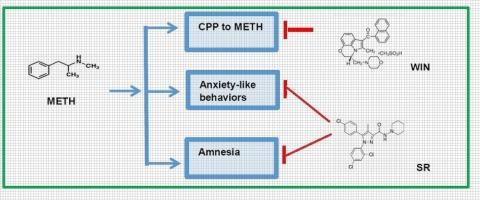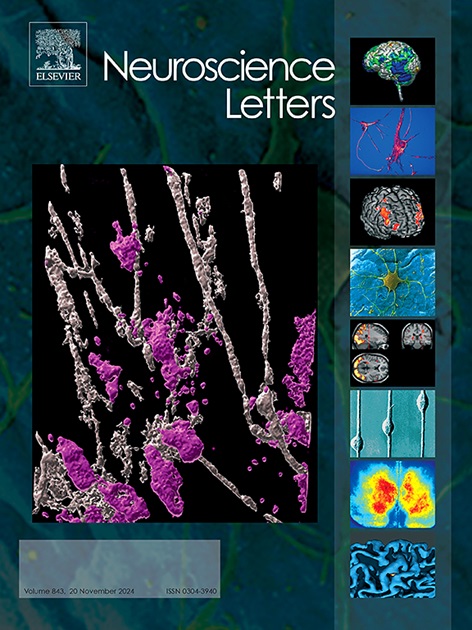Cannabinoid receptor type 1 agonist disrupts methamphetamine-induced conditioned place preference in adolescent male rats
IF 2.5
4区 医学
Q3 NEUROSCIENCES
引用次数: 0
Abstract
Addiction can be viewed as a state of compulsive engagement in drug use. It is believed that drug-associated memories maintain compulsive drug-seeking behavior. Therefore, disrupting drug-associated memories may reduce drug-seeking behavior. In the present study, a conditioned place preference (CPP) apparatus was conducted to evaluate the effect of cannabinoid receptor type 1 (CB1R) agonist and antagonist on the acquisition of CPP induced by methamphetamine (METH). Anxiety behaviors and memory retrieval were assessed using elevated plus maze (EPM) and step-through passive avoidance tasks. In this study using a 5-day schedule of CPP, exposure to METH increased the time spent in the drug-paired compartment, and CB1Rs agonist (WIN 55,212–2, WIN) disrupted the METH-induced CPP. In the EPM experiment, METH significantly decreased the ratio of times spent in the open arms to total times spent in any arms (OAT) and the ratio of entries into open arms to total entries (OAE), indicating that METH increases anxiety-like behaviors. However, the CB1Rs antagonist (SR141716A, SR) reversed METH-induced anxiety behaviors. The results obtained in the passive avoidance experiment showed that blockade of brain CB1Rs by SR improves METH-induced amnesia. In summary, CB1Rs appear to modulate METH-associated memories, and antagonists of CB1Rs may serve as a therapeutic target for METH-induced anxiety behaviors.

大麻素受体1型激动剂可破坏青春期雄性大鼠甲基苯丙胺诱导的条件性位置偏好。
成瘾可以被视为一种强迫性使用毒品的状态。人们认为,与毒品有关的记忆会维持强迫性的觅药行为。因此,破坏毒品相关记忆可能会减少觅毒行为。本研究采用条件性位置偏好(CPP)装置,评估大麻素受体1型(CB1R)激动剂和拮抗剂对甲基苯丙胺(METH)诱导的CPP习得的影响。焦虑行为和记忆检索采用高架加迷宫(EPM)和步进式被动回避任务进行评估。在这项为期 5 天的 CPP 研究中,暴露于 METH 会增加在药物配对区所花费的时间,而 CB1Rs 激动剂(WIN 55,212-2, WIN)会破坏 METH 诱导的 CPP。在 EPM 实验中,METH 明显降低了在开放臂中花费的时间与在任何臂中花费的总时间之比(OAT),以及进入开放臂的时间与总进入时间之比(OAE),这表明 METH 会增加焦虑样行为。然而,CB1Rs 拮抗剂(SR141716A,SR)可逆转 METH 诱导的焦虑行为。被动回避实验的结果表明,用SR阻断大脑中的CB1Rs可以改善METH诱导的健忘症。综上所述,CB1Rs在METH相关记忆中起调节作用,CB1Rs拮抗剂可作为METH诱导的焦虑行为的治疗靶点。
本文章由计算机程序翻译,如有差异,请以英文原文为准。
求助全文
约1分钟内获得全文
求助全文
来源期刊

Neuroscience Letters
医学-神经科学
CiteScore
5.20
自引率
0.00%
发文量
408
审稿时长
50 days
期刊介绍:
Neuroscience Letters is devoted to the rapid publication of short, high-quality papers of interest to the broad community of neuroscientists. Only papers which will make a significant addition to the literature in the field will be published. Papers in all areas of neuroscience - molecular, cellular, developmental, systems, behavioral and cognitive, as well as computational - will be considered for publication. Submission of laboratory investigations that shed light on disease mechanisms is encouraged. Special Issues, edited by Guest Editors to cover new and rapidly-moving areas, will include invited mini-reviews. Occasional mini-reviews in especially timely areas will be considered for publication, without invitation, outside of Special Issues; these un-solicited mini-reviews can be submitted without invitation but must be of very high quality. Clinical studies will also be published if they provide new information about organization or actions of the nervous system, or provide new insights into the neurobiology of disease. NSL does not publish case reports.
 求助内容:
求助内容: 应助结果提醒方式:
应助结果提醒方式:


